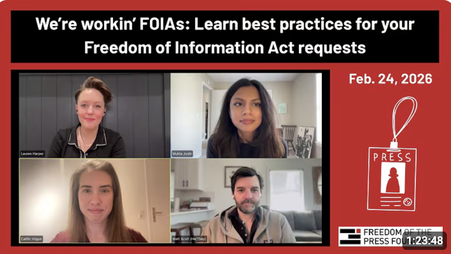
In November 2014, James De La Rosa was shot and killed by Bakersfield police officers. He was unarmed and 22 years old. Following his death, his family desperately wanted answers. But in California, police misconduct records are generally not available to the public—limiting what the De La Rosa family was able to learn about the officers who killed James.
“One of the officers who was involved in James’s shooting has reportedly also been involved in seven other shootings, while another officer has reportedly been involved in another killing,” James De La Rosa’s mother Leticia said in a statement to the ACLU. “Yet state law shields their records and families like mine rarely get answers to the questions we ask. All we get is secrecy.”
Like Leticia De La Rosa, Theresa Smith had a son killed by California police officers. Caesar Cruz was shot in a Walmart parking lot—allegedly multiple times—by Anaheim police officers before dying in a hospital a half hour later. An attorney for Cruz’ family called his death a “police execution.”
But all that Cruz’ family was allowed to know about her son’s death was that five officers were involved, and it took Smith over a year and a half to determine the name of the officer who killed Caesar Cruz.
While police misconduct information is public record in many states, that’s not the case in California. Even when an officer is repeatedly accused of or disciplined for abuse, these records are considered part of an officer’s personnel file.
In the 1970s, Gov. Jerry Brown signed into law a measure that blocked public access to misconduct documents, and forced defendants to petition a judge to examine these records in private and decide if the information warranted disclosure. In 2006, the California Supreme Court ruled that police misconduct investigations are confidential, a ruling that has kept answers from families of people hurt by police violence, obscured critical information about public officials from journalists, and shielded police from scrutiny.
Leticia De La Rosa and Theresa Smith are both advocates for a California bill that could make police investigation and disciplinary records available to the public in particularly egregious instances of misconduct.
“This bill would require, notwithstanding any other law, certain peace officer or custodial officer personnel records and records relating to specified incidents, complaints, and investigations involving peace officers and custodial officers to be made available for public inspection pursuant to the California Public Records Act,” reads California State Senate Bill 1421.
If SB 1421, sponsored by Sen. Nancy Skinner (D-Berkeley), becomes law, personnel records could be released to the public. Journalists would be able to more easily access information, like when officers shoot, kill, commit perjury, sexually assault, lie in an investigation, or seriously injure a citizen.
Some police labor unions have fought the bill fiercely. The California Sheriffs Association argued that the bill could jeopardize officer privacy and create a financial burden on local agencies. Los Angeles Times journalist Liam Dillon noted that the Los Angeles Police Protective League gave the maximum contribution allowable to a dozen Assembly Democrats as they considered the bill.
Despite opposition from police unions, Nikki Moore, legal counsel and legislative at California News Publishers Association, noted that the California Police Chiefs Association came on in support of the bill. “When they fire an officer and have evidence of misconduct, they can’t tell the public. They saw value in this transparency, and it’s a new perspective.”
SB 1421 has made it to the governor’s desk. It isn’t the only bill awaiting Jerry Brown’s signature that could improve access to police records. Assembly Bill 748 would require police departments to make body camera footage of most officer shootings and serious uses of force publicly available.
In a blog post, California Public Records Act attorney Anna von Herrmann wrote that the bill would open up critical access to records about egregious officer misconduct. “Given the enormous power that law enforcement agencies wield, from the power to arrest and detain individuals to the power to use lethal force, public access to this information could be a powerful tool to understanding and challenging law enforcement abuses.”
The impacts of both bills for transparency could be huge—for families like Cruz’ and De La Rosa’s, community organizers, and journalists reporting on police violence and abuse of power.
“Access to government records is a fundamental principle of democracy,” said Moore. “California, for so long, has denied access to these records, retaining complete discretion over disclosure. You have government agencies acting as editor.”
SB 1421 and AB 748 both await Governor Jerry Brown’s signature. He should sign them both.




